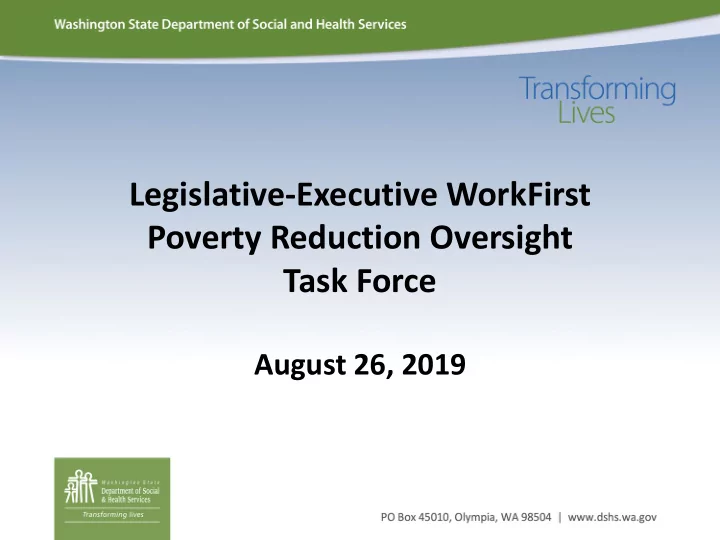

Legislative-Executive WorkFirst Poverty Reduction Oversight Task Force August 26, 2019
Agenda • Welcome and Introductions • Taskforce Business • Updates on ESSHB 1603 implementation • DCYF Transitions – Update on Phase 2 • Drivers of Homelessness in Washington State – Tedd Kelleher – Managing Director, Housing Assistance Unit Dept. of Commerce • Strategic Plan – Review and Discussion • Public Comment
ESSHB 1603 Implementation Effective July 28, 2019 ESSHB 1603 ends permanent sanction disqualification and adds homelessness as a criteria for time limit extension. • Rule changes effective 7/28/2019 • Communication and training for agency staff • Outreach to potentially impacted households and partners
Department of Children, Youth & Families Update on Phase 2
Drivers of Homelessness in Washington State Tedd Kelleher – Managing Director, Housing Assistance Unit Department of Commerce
Strategic Plan Five-year plan due December 1, 2019 • Develop and align with recommendations coming out of the Task Force Advisory Committee (Governor’s Poverty Reduction Workgroup) • Focus: • Intergenerational poverty • Workfirst/TANF • Equity, Diversity and Inclusion
Recommendation Themes Health Education Overarching/Social Capital Employment/ Criminal Justice/Re-entry Workforce Benefits/Program Concerns
Recommendations Overarching/Social Capital: Access Continuum of Care Streamline eligibility Comprehensive career services Wrap-around services Eliminate fiscal cliffs Ensure respectful customer services Provide choices
Recommendations Overarching/Social Capital: Continue to Enhance Efforts to Ensure Common Professional Development Equity & Cultural Competency Cultural competency Trauma-informed Care Implicit/explicit bias & institutional racism Building empathy History of racism & discrimination in the U.S., Engaging case management approaches its economic impact and resulting trauma (strength based)
Recommendations Criminal Justice/Re-entry: Ensure Supports for Families of Better Re-entry Preparation & Incarcerated People Resources Develop a need/risk assessment – equitable Assign a case manager to assist in accessing social & economic services/resources social/economic support services Connect individuals to appropriate Prioritize family unification community resources Support community college re-entry education programs for people leaving incarceration
Recommendations Benefits/Program Concerns: State Agency Coordination & Effective Assistance Programs Strategic Goals Coordination of programming between DSHS, Update the Standard of Need and public HCA, DCYF, Commerce, ESD, SBCTC, and OSPI assistance benefit levels Agency accountability to a shared set of Ensure access to Temporary Assistance to outcomes for individual, child, and family Needy Families by restoring recession-era well-being program cuts Reorient Washington’s "work - first” approach Restructure programs to provide a respectful, to Temporary Assistance for Needy Families integrated, seamless continuum of care around “families - first”
Recommendations Education: Access Support Expand eligibility for the Early Childhood Education Assistance Program (ECEAP) to 180 Provide funding for childcare services to percent of the federal poverty line post-secondary students Ensure funding for post-secondary education for children who are in TANF households
Recommendations Employment/Workforce: Accessible Programs Relevant Programs Adequately funded Living-wage workforce development and employment training programs Accessible to people living in poverty or Specifically tailored to those most impacted experiencing homelessness by poverty - including youth Include a broad range of opportunities - entrepreneurial and small business
Recommendations Health: Access Children & Families Necessary funding and resources targeted directly to increase access and availability of Additional school-based counselors and mental health services screenings Teacher trainings on early intervention steps Expand capacity of inpatient facilities Training to help Child Protective Service Opportunities for interpersonal relationship workers understand parental culture, building between providers and clients parenting styles, struggles that single parents face, etc.
Discussion • Thoughts on how these recommendations connect with the five-year plan to reduce intergenerational poverty and promote self-sufficiency? • Next steps
Public Comment
Recommend
More recommend